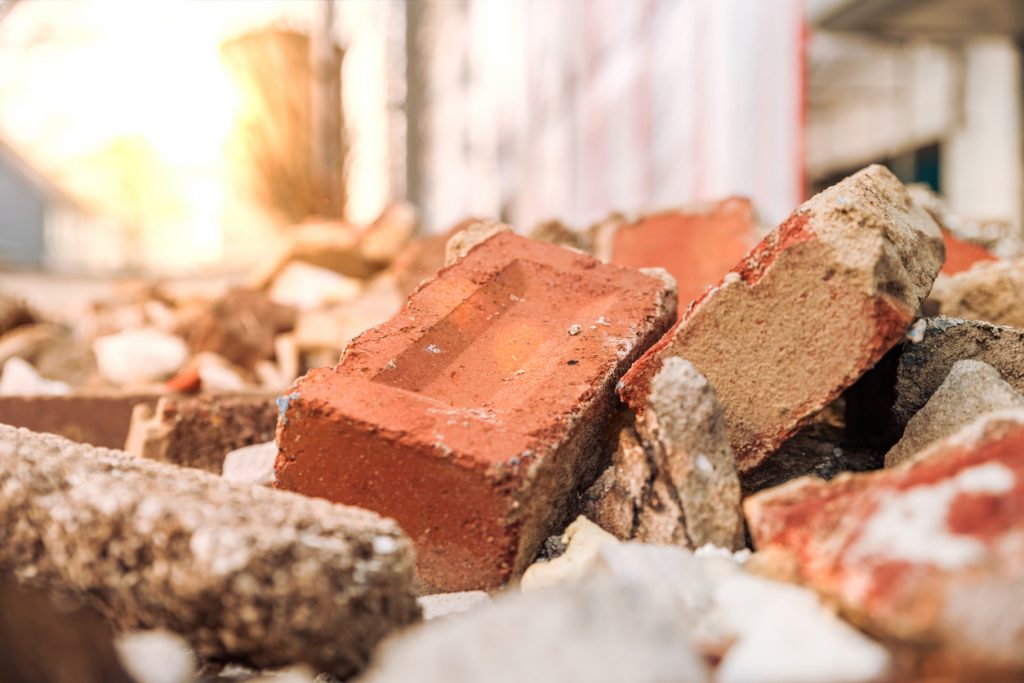How Can Construction Waste Be Reduced?
The construction and demolition industry in the UK produces large quantities of waste every year – 67.8 million tonnes in 2018 – so when it comes to waste reduction, it feels like an area ripe for improvements.
Obviously, there is an inevitability about waste from this industry due to the constant need to clear land, build new homes and commercial sites and then repeat the cycle. However, time spent reducing waste in construction and demolition not only makes the industry more environmentally friendly, but it also saves companies money, too. So how can construction waste be reduced?
This month, we’re taking a look at how waste management, material ordering, reuse and recycling, and hazardous waste can all make a difference to waste reduction.

The importance of proper waste management
First and foremost in the defence against waste is proper waste management. Having the right skips, containers and bins in place means that your team can dispose of waste properly, with recyclables going into the correct material stream and avoiding contaminating them. A Site Waste Management Plan (SWMP) should help with this as it can factor in waste management to improve efficiencies and outline the obligation to minimise waste from the outset of the project.
Through professional waste management services, such as those we offer at SCS Waste, you can keep an organised site and avoid sending as much waste to landfill sites as possible. We’ll ask how many containers you need, where you need them placed and what different types of waste you’ll be disposing of to ensure you get the right level of service.
We’re licensed and accredited in waste management, helping to provide a secure and reliable way to dispose of large quantities of construction and demolition materials.
Proper processes for material ordering
If you’ve arranged your waste management, the next thing to focus on is the other end of the process: the materials you bring in. Ordering usually revolves around ensuring you have enough to meet the requirements of the job, with many companies over-ordering to account for any erroneous measuring or misplacement of items.
This approach, though understandable, clearly is a wasteful one, so here are some ways to tackle this problem:
-
- Ensure you measure correctly for the job
- Where possible, utilise a quantity surveyor for better, more accurate planning
- Check your inventory regularly – do you actually need to order more?
- Plan your waste containers in relation to the potential excess materials
- Assess at the end of one project whether excess materials can be moved to the next project
Reuse and recycling for building materials
The common mantra to combat waste is ‘reduce, reuse, recycle’. And since we’ve just covered the reduction side of things, let’s look at reusing and recycling for building materials:
Reuse
Keep your materials in good condition and you can carry them over to future projects or other areas of the same project. This will save on waste as well as saving you money.
If you have leftover concrete, can it be crushed to use as aggregates? If you have unpainted, untreated timber leftover, can it be chipped or mulched for another use?
If you can’t use materials again, can they be donated to local causes? This could include fixtures, fittings and even simple things like doors and flooring materials still in good condition. They could be given a new lease of life this way and it saves you space in your skips and bins.
Recycle
Ensure you have containers to collect different types of recyclable materials, making it easier for your employees to segregate waste.
Train your staff to manage and handle waste according to your recycling plans and the containers you provide.
If you are unable to have segregated bins and skips on site, engage the services of a professional waste management company with a recycling centre and waste transfer station.
Control of hazardous waste
While hazardous waste is hard to reduce – its very nature forces the need to dispose of it, with no option to recycle or reuse – controlling your hazardous waste disposal is still important. This is because if hazardous waste is not dealt with separately, it can contaminate your regular, recyclable waste.
For this reason, you should establish whether there is hazardous waste involved in your project before work begins. This will allow you to arrange specialist hazardous waste disposal and collection services, keeping the rest of your waste safe to recycle or reuse.
Skip hire and waste management for the south coast
If you operate in construction and demolition as a site manager – or even as an independent contractor – and you want to reduce waste in your business, look no further than SCS Waste. Our decades of industry experience mean we’ve worked across Arundel, Littlehampton, Bognor Regis and the surrounding areas helping commercial operations in dealing with waste.
We have a wide variety of services available no matter what project you’re undertaking. Our waste management services help to control and segregate your waste, including large RORO skips and waste compactors. Contact us today for a quote and let us help you do more to minimise waste.

